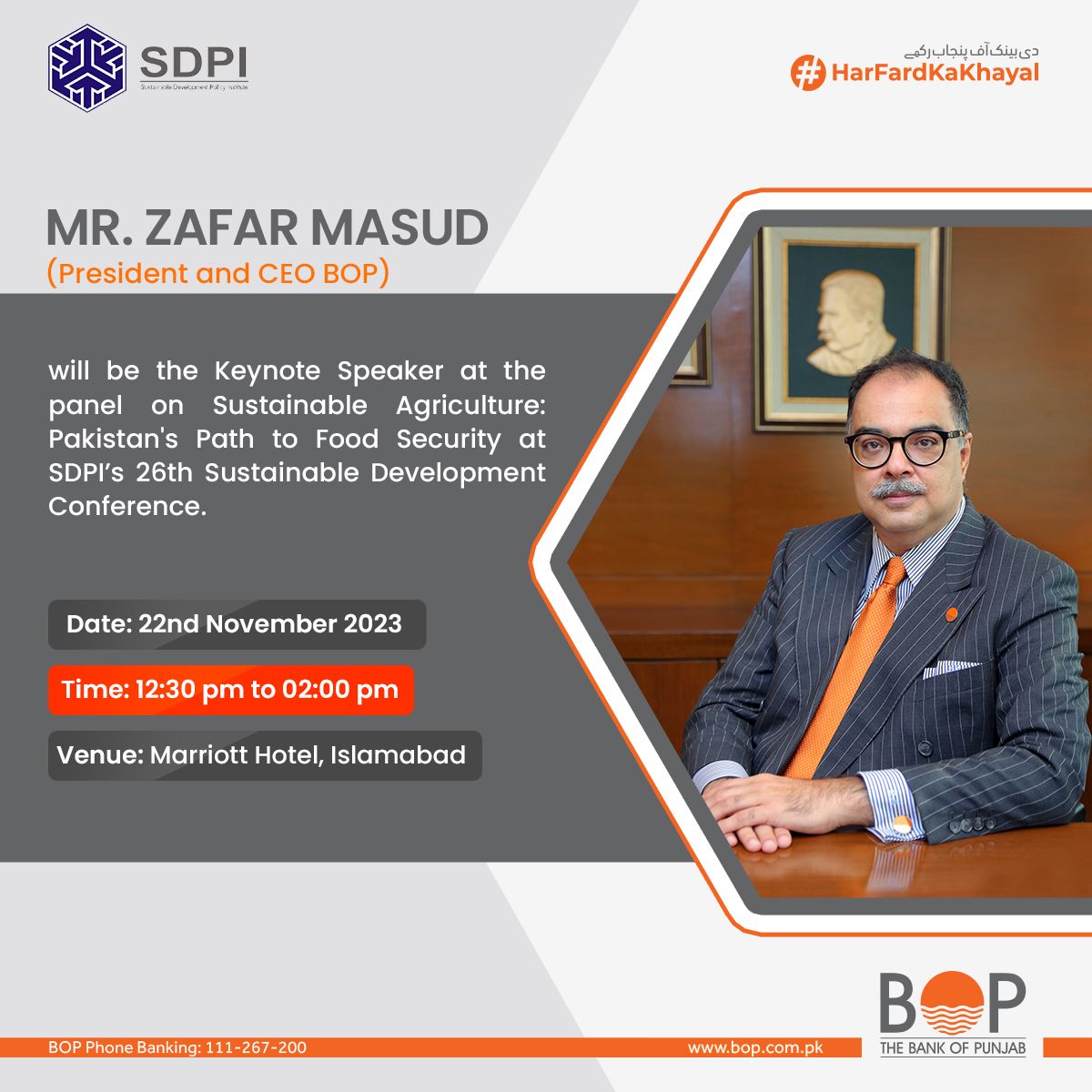Zafar Masud (President & CEO – BOP) was honored to serve as the Keynote Speaker at the 26th Sustainable Development Conference. The session, held on 22 November 2023, focused specifically on Sustainable Agriculture and Pakistan’s Path to Food Security. Other notable speakers also presented their points of view during the panel.
Zafar Masud’s Keynote Speech
Mr. Zafar Masud (President and CEO – BOP) sharing his expert opinion on ‘Sustainable Agriculture: Pakistan’s Path to Food Security at SDPI’s 26th Sustainable Development Conference.
In all its endeavors, The Bank of Punjab remains steadfast in its mission to champion excellence and innovation.
Complete video: https://youtu.be/OHwvqw1WS5M

The 26th Sustainable Development Conference (SDC)
The 26th Sustainable Development Conference (SDC) was held in Islamabad, Pakistan, from November 21 to 23, 2023. It was organized by the Sustainable Development Policy Institute (SDPI) and brought together experts, policymakers, and civil society representatives from around the world to discuss how to achieve the Sustainable Development Goals (SDGs).
The theme of the conference was “Light at the End of the Tunnel: Hope in Times of Despair.” This reflected the growing sense of urgency and frustration with the slow pace of progress on the SDGs, but also the determination to find solutions and build a better future.
The conference covered a wide range of topics, including:
- Climate change and environmental sustainability
- Poverty and inequality
- Education and health
- Gender equality and women’s empowerment
- Peace and security
- Economic growth and development
A particular focus of the conference was on the challenges facing Pakistan, such as climate change, water scarcity, and political instability. Participants discussed how the SDGs could be used to address these challenges and build a more resilient and sustainable future for the country.
The conference also featured a number of side events, workshops, and exhibitions. These provided opportunities for participants to learn more about specific issues, network with others, and share their own experiences and expertise.
The 26th SDC was a success in raising awareness of the SDGs and promoting collaboration on achieving them. The conference generated a number of concrete recommendations, which will be taken forward by SDPI and other organizations.
The 26th SDC was a reminder that the SDGs are not just an aspiration, but a roadmap for a better future. By working together, we can create a world that is more just, equitable, and sustainable for all.
The Sustainable Development Policy Institute (SDPI): A Pakistani Think Tank for a Better Future
The Sustainable Development Policy Institute (SDPI) is a non-profit research organization based in Islamabad, Pakistan. Founded in 1992 on the recommendation of the Pakistan National Conservation Strategy, it has since become a leading think tank dedicated to promoting sustainable development in Pakistan and the wider South Asian region.
Mission and Vision
- Mission: To conduct research, policy analysis, and advocacy on a wide range of issues related to sustainable development, with a focus on poverty reduction, environmental sustainability, and good governance.
- Vision: To be a leading research institute in South Asia, recognized for its independent, rigorous, and policy-relevant research that contributes to a more just, equitable, and sustainable future for all.
Core Activities
- Research: SDPI conducts in-depth research on a variety of topics, including climate change, water scarcity, energy security, economic development, social justice, and peacebuilding.
- Policy analysis: The institute provides policymakers with evidence-based research and analysis to inform their decision-making on sustainable development issues.
- Advocacy: SDPI actively engages with policymakers, civil society organizations, and the media to advocate for policies that promote sustainable development.
- Capacity building: The institute offers training programs and workshops to help individuals and organizations develop their skills and knowledge in sustainable development.
- Knowledge sharing: SDPI publishes research reports, policy briefs, and other materials to share its findings with a wider audience.
Impact and Achievements
- SDPI has played a key role in shaping Pakistan’s climate change policy, including the development of the National Climate Change Policy.
- The institute’s research on water scarcity has helped inform government investments in water conservation and management.
- SDPI’s advocacy for gender equality and women’s empowerment has led to progress in areas such as education and access to justice.
- The institute has also been instrumental in promoting peacebuilding and conflict resolution in Pakistan.
Overall, the Sustainable Development Policy Institute is a vital force for positive change in Pakistan and beyond. Through its research, policy analysis, and advocacy, SDPI is helping to build a more just, equitable, and sustainable future for all.